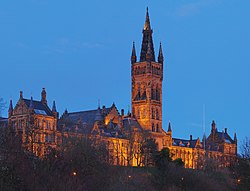History
The Peel Club, historically referred to as Glasgow University Peel Club, [7] was founded in 1836 as a political association at the University of Glasgow. It was named after its patron Sir Robert Peel, Prime Minister of the United Kingdom under William IV and, later, Queen Victoria. [8] [9] It was intended to serve as a platform for discussing Conservatism and public policy, engaging in debate and rhetoric, and assisting with Conservative election campaigns. Some sources state that the Peel Club was founded in annual commemoration of Sir Robert Peel's election to the position of Lord Rector of the University of Glasgow, due to his Conservative leanings. [8] [10] Sir James Graham, sometime Lord Rector of the University of Glasgow, stated that the founding of the Peel Club was the first political organisation of its kind in the walls of the University of Glasgow. [10] After Peel's death in 1850, the Peel Club was disbanded and replaced by a new organisation in 1852 called Glasgow University Conservative Club, which after 120 years in 1972 became Glasgow University Conservative Association. [11]
A particular aim of the club, which would later be restated in the 1972 Constitution, was to preserve the dignity of the Rectorial Chair of the university by promoting prominent Conservatives to occupy the position. This has resulted in many famous Conservative candidates, the most notable of whom was Benjamin Disraeli, who was elected to the three-year term in 1871 and 1874. [12] The Peel Club's role was debated in the House of Commons in 1840. [10] Concerns were raised about whether universities should allow such political organisations to operate, as it was argued that they could contribute to disorderly or frivolous activities among the student body. The matter was brought before the House by Robert Wallace, MP for Greenock, [10] who argued that university professors, especially those funded by the nation, should abstain from endorsing or supporting political meetings conducted by students, to preserve the institution's neutrality. The motion was withdrawn without being put to a vote. [10]
The Peel Club's involvement in student elections sparked public protests against what was perceived as politically motivated and trivial behaviour. Political figures, including Sir James Graham and Peel, engaged in discussions about the club, highlighting the significant attention the issue attracted. Eventually, it was suggested that Glasgow University professors should directly address the matter to prevent further controversies. [13]
Activities
Today, the Association operates as a forum for students to discuss Conservative politics and participate in events and campaigning in Glasgow and further afield around Scotland. The Association is affiliated with the national Conservative Party through Scottish Young Conservatives which brings together associations of young conservatives throughout Scotland, mainly through university groups.
The Association is operated by a six-strong Executive, which comprises the President, vice-president, Secretary, Treasurer, Outreach Officer, and Union Officer who are elected on an annual basis at the association's Annual General Meeting in May. The society also boasts having had Ruth Davidson as its honorary President in the past.
The Association executive organises a range of events throughout the academic year. This primarily includes the Annual St Andrew's Day Dinner held every year in November, as well as its monthly 'Pint & Policy' events. The Association also regularly campaigns for the Conservative Party for elections at all levels across the country.
This page is based on this
Wikipedia article Text is available under the
CC BY-SA 4.0 license; additional terms may apply.
Images, videos and audio are available under their respective licenses.

